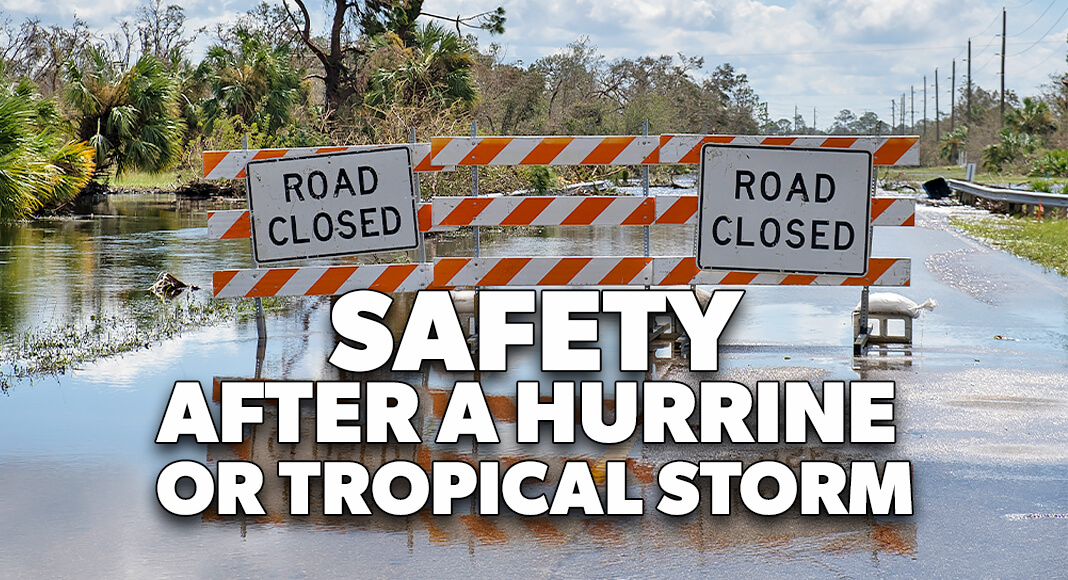
Mega Doctor News
Protect yourself from hazards outside
Stay out of floodwater.
- Always follow warnings about flooded roads.
- Don’t drive in flooded areas—cars or other vehicles won’t protect you from floodwaters. They can be swept away or may stall in moving water.
- If you have to be in or near floodwater, wear a life jacket—especially if the water is rising.
- Wash your hands with soap and water if you have been in floodwater. If you don’t have soap or water, use alcohol-based wipes or sanitizer. Floodwater can contain many things that may harm health, including germs, dangerous chemicals, human and livestock waste, wild or stray animals, downed power lines, and other contaminants that can make you sick.
- Learn more on how to stay safe after a flood.
Be careful near damaged buildings.
- Do not enter a damaged building until local authorities determine it is safe. Hurricanes can damage buildings and make them unsafe.
- Leave your home or building if you hear shifting or unusual noises. Strange noises could mean the building about to fall.
Stay away from power lines.
- Watch out for fallen power lines that may be hanging overhead.
- Stay clear of fallen power lines. Call the electric company to report them.
- Learn more on how to protect yourself from electrical hazards after a disaster.
Protect yourself from animals and pests.
- Use insect repellent (bug spray) with DEET or picaridin. Wear long sleeves, pants, and socks when you’re outside. Learn how to protect yourself and your family from mosquito bites.
- Stay away from wild or stray animals after a storm. Call 911 or your public health department to report them.
- Report dead animals to local officials.
- Learn more on how to protect yourself from animals or pests after a disaster.
Protect yourself from hazards in your home
Prevent carbon monoxide poisoning.
Fuel-burning equipment creates carbon monoxide (CO). This can include equipment like generators, pressure washers, charcoal grills, and camp stoves. You can’t smell or see carbon monoxide, but if it builds up in your home, it can cause sudden illness and death.
- Never use portable gasoline or coal-burning equipment or camp stoves inside your home, basement, or garage. Keep it outside and at least 20 feet from any window, door, or vent.
- Use a battery-operated or battery backup CO detector any time you use a generator or anything else that burns fuel.
- If you have a CO detector and it starts beeping, leave your home right away and call 911.
Check out Carbon Monoxide Poisoning for more information.
Never use a wet electrical device.
- Turn off the power at the main breaker in your house if the device is still plugged in. Wait for an electrician to check the device before using it.
- Learn more about electrical safety after a disaster or emergency.
If the power is out, use flashlights instead of candles.
- If you have to use candles, keep them away from anything that can catch fire. Always stay near lit candles.
- Keep a fire extinguisher handy, and make sure your family knows how to use it. Read the National Fire Protection Association’s tips for using fire extinguishers.
- Learn more about hazards related to power outages.
Clean up your home safely.
Take steps to protect yourself and your loved ones during cleanup after a hurricane.
- Follow safety precautions before reentering your flooded home.
- Follow our cleanup tips and monitor your radio or television for up-to-date emergency information.
Take care of your physical and mental health
Drink safe water.
- Listen to reports from local officials for advice on water precautions in your home.
- Do not use water you suspect or have been told is contaminated to make baby formula, make ice, brush your teeth, wash and prepare food, wash your hands, or wash dishes.
- Bottled, boiled, or treated water are safe for drinking, cooking, and personal hygiene. Your state, tribal, local, or territorial health department can make specific recommendations for boiling or treating water in your area.
- Learn more about using safe water after a disaster.
Eat safe food.
- Throw away food that may have come in contact with flood or storm water. Unsafe food can make you sick even if it looks, smells, and tastes normal.
- Throw away perishable foods that have not been refrigerated properly due to power outages; also discard foods with an unusual odor, color, or texture. When in doubt, throw it out!
- Learn more about how to keep food safe after a disaster.
Wash your hands.
Good basic personal hygiene and handwashing are critical to help prevent the spread of illness and disease. Clean, safe running water is essential for proper hygiene and handwashing. Hygiene is especially important after an emergency like a hurricane, but finding clean, safe running water can sometimes be hard.
- Learn more about personal hygiene and handwashing after a disaster.
Take care of any wounds or injuries to prevent infection.
The risk for injury during and after a hurricane and other natural disasters is high.
- Get first aid quickly to help heal small wounds and prevent infection.
- Learn more about proper wound care after a disaster.
Take care of your emotional health.
During and after a hurricane, it is natural to experience different and strong emotions. Coping with these feelings and getting help when you need it will help you, your family, and your community recover from a disaster.
Contact SAMHSA’s Disaster Distress Helpline
Disaster Distress Helpline: CALL or TEXT 1-800-985-5990 (press 2 for Spanish). People with deafness or hearing loss can use their preferred relay service to call 1-800-985-5990.
- Connect with family, friends, and others in your community.
- Take care of yourself and each other, and know when and how to seek help.
- Learn more on how to take care of your emotional health after a disaster.









